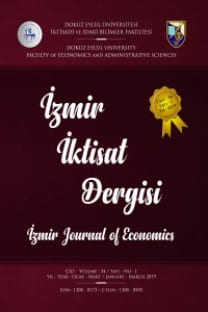Etik Liderliğin Sosyal Sermaye Üzerindeki Etkisi Üzerine Bir Araştırma
Etik, Liderlik, Sosyal Sermaye
A Study on the Impact of Ethical Leadership on Social Capital
Ethics, Leadership, Social Capital,
___
- AYKANAT, Z. (2014) “Psikolojik Sözleşmenin İhlali Algısında Örgütsel Adaletin Etkisi ve Etik Liderin Aracı Değişken olarak Rolü: Kalkınma Ajanslarında Uygulama” Atatürk Üniversitesi Sosyal Bilimler Enstitüsü İşletme Anabilim Dalı, Yayımlanmamış Doktora Tezi, Erzurum.
- BEEKUN, R. I. (1996) “Islamic Business Ethics”, International Institute of Islamic Thought, (703) 471-1133, s.1-14, Erişim tarihi: 17.11.2015
- BOURDİEU, P. (1986) “Forms of Capital, Handbook of Theory and Research for the Sociology of Education,” edt: John G. Richardson, Greenwood Press, Westport, CT, 241-258, http://econ.tau.ac.il/papers/publicf/Zeltzer1.pdf (11.12.2012).
- BROWN, M. E., TREVINO, L. K. & HARRISON, D. A. (2005) “Ethical Leadership: A Social Learning Perspective For Construct Development And Testing”, Organizational Behavior and Human Decision Processes, 97, 117–134.
- BROWN, M. E. & TREVINO, L. K. (2006) “Ethical Leadership: A Review And Future Directions” The Leadership Quarterly, 17, 595-616.
- BROWN, M. E. (2007) “Misconceptions of Ethical Leadership: How to Avoid Potential Pitfalls” Organizational Dynamics, Vol. 36, No. 2, , ss. 140–155.
- CALDWELL, C. & HAYES, L. A. & LONG, D. T. (2010) “Leadership, Trustworthiness, and Ethical Stewardship” Journal of Business Ethics, 96, 497-512
- COLEMAN, J. S. (1988) “Social Capital In The Creation Of Human Capital” The American Journal of Sociology, 94, 95-120.
- COLLİER, P. (1998) “Social Capital and Poverty”, Social Capital Initiative Working Paper, 4, http://internationalbudget.org/wp-content/uploads/Social-Capital-and-Poverty.pdf, (Erişim Tarihi: 02.01.2013).
- ÇETİN, M. (2006) “Bölgesel Kalkınmada Sosyal Ağların Rolü: Silikon Vadisi Örneği”, D.E.Ü.İ.İ.B.F. Dergisi Cilt:21 Sayı:1, Yıl:2006, ss:1-25
- ÇOLAK, Ö. F. VE BEKMEZ, S. (2007) “Kayıtdışı Ekonomi ve Siyasal Tercihler”, Ankara: Nobel Basımevi.
- ERBİL, C. (2008) “Sosyal Sermayeye Örgütsel Bir Yaklaşım: Bir Model Önerisi,” Yayınlanmamış Yüksek Lisans Tezi, Selçuk Üniversitesi Sosyal Bilimler Enstitüsü.
- ERDEM, O. VE DİKİCİ, M. (2009) “Liderlik ve Kurum Kültürü Etkileşimi” Electronic Journal of Social Sciences, C.8 S.29 (198-213)
- FAIRHOLM, M. R. (2002) “Defining Leadership: A Review of Past, Present, and Future Ideas,” ,ss.1-45, Erişim tarihi: 13.11.2015,
- http://www.strategicleaders.org/system/files/private/definingleadership-past-present.pdf
- FUKUYAMA, F. (2000), “Social Capital and Civil Society”, IMF Working Paper, 74, http://www.imf.org/external/pubs/ft/seminar/1999/reforms/fukuyama.htm (Erişim Tarihi: 03.01.2014).
- HANIFAN, L. J. (1916) “The Rural School Community Center” Annals of the American Academy of Political and Social Science, 67, 130-138.
- HAQ, S. (2011) “Ethics And Leadership Skills In The Public Service” Procedia Social and Behavioral Sciences, 15, ss. 2792–2796.
- http://www.muslimtents.com/aminahsworld/ethicshm.pdf
- JENSEN, S. M. & LUTHANS, F. (2006) “Entrepreneurs As Authentic Leaders: Impact On Employees Attitudes” Leadership & Organization Development Journal, 27/8, 646-666.
- KEELEY, B. (2007) “Human Capital How What You Know Shapes Your Life,” OECD Insights, http://www.keepeek.com/Digital-Asset-Management/oecd/education/human-capital_9789264029095-en, (Erişim Tarihi: 17.12.2013).
- MAAK, T. (2007) “Responsible Leadership, Stakeholder Engagement, and the Emergence of Social Capital” Journal of Business Ethics, 74, 329-343.
- MCCALLUM, S. & O’CONNELL, D. (2009) “Social Capital And Leadership Development: Building Stronger Leadership Through Enhanced Relational Skills” Leadership & Organization Development Journal, 30/2, 152-166.
- MELE, D. (2003) “Organizational Humanizing Cultures: Do They Generate Social Capital?” Journal of Business Ethics, 45, 3-14.
- NAHAPIET, J. VE GHOSHAL, S. (1998) “Social Capital, Intellectual Capital, and the Organizational Advantage” The Academy of Management Review, 23 (2), 242-266.
- PASTORIZA, D.& ARINO, M. A. & RICART, J. E. (2008) “Ethical Managerial Behaviour As An Antecedent of Organizational Social Capital” Journal of Business Ethics, 78, 329-341.
- PASTORIZA, D.& ARINO, M. A. & RICART, J. E. (2009) “Creating an Ethical Work Context: A Pathway to Generate Social Capital in the Firm” Journal of Business Ethics, 88, 477-489.
- PASTORIZA, D. & ARINO, M. A. (2013) “Does the Ethical Leadership of Supervisors Generate Internal Social Capital?” Journal of Business Ethics, 118, 1–12.
- PIEPER, A. (1999) “Etiğe Giriş”, Ayrıntı Yayınları, İstanbul.
- Putnam, R. D. (1995) “Tuning In, Tuning Out: The Strange Disappearance of Social Capital in America” PS: Political Science and Politics, 28 (4), 664-683.
- TUNA, M. & BİRCAN, H. & YEŞİLTAŞ, M. (2012) “Etik Liderlik Ölçeği’nin Geçerlilik Ve Güvenilirlik Çalışması: Antalya Örneği” Atatürk Üniversitesi İktisadi ve İdari Bilimler Dergisi, Cilt: 26, Sayı: 2, ss.143-155.
- TUNG, J. (2012) “Guanxi and Ethics-A Study of Chinese Management Behaviour” American Journal of Applied Sciences, 9/2, 223-226.
- TÜZEMEN, S. (2013) “Güven ve İlişkiler Bağlamında Sosyal Sermayenin Akademik Verimliliğe Etkisi: Karadeniz Teknik Üniversitesi Örneği,” Yayınlanmamış Yüksek Lisans Tezi, Karadeniz Teknik Üniversitesi Sosyal Bilimler Enstitüsü.
- WOOLCOCK, M. & NARAYAN, D. (2000) “Social Capital: Implications for Development Theory, Research, and Policy” World Bank Research Observer, 15 (2), 1-26.
- ISSN: 1308-8173
- Yayın Aralığı: Yılda 4 Sayı
- Başlangıç: 1986
- Yayıncı: Dokuz Eylül Üniversitesi İktisadi ve İdari Bilimler Fakültesi
Endüstriyel İşletmelerde Franchising Model Önerisi: Hazır Beton Sektöründe Bir Uygulama
Türkiye Bisküvi, Çikolatalı ve Şekerli Mamuller Sektörü: Firma Yoğunlaşma Analizi
Türkiye Ekonomisinde Sektörel Enerji Tüketiminin Ayrıştırma Yöntemiyle Analizi
Alper YILMAZ, Serap ÜRÜT KELLECİ, Aziz BOSTAN
Seval AKBULUT BEKAR, Harun TERZİ
Kredi Kanalı İle Aktarım: Bireysel Krediler Üzerine Bir Uygulama
Oğuz KARA, Neslihan AKIN ÖZDEMİR
Sağlık ile Kalkınma Arasındaki İlişkinin Asimetrik Nedensellik Analizi
İbrahim ARSLAN, Mehmet Vahit EREN, Selahattin KAYNAK
Yapay Sinir Ağları ile Çok Aşamalı Fiyat Tahmini: BIST30 Senetleri Üzerine Bir Araştırma
Kamu Yatırımlarının Özel Sektör Yatırımlarını Dışlama Etkisi: Türkiye Örneği
Cüneyt Yenal KESBİÇ, Özlem DÜNDAR, Ata DEVRİM
Temettü Ödemelerinin Belirleyicileri ve Firma Değeri: Kavramsal Bir Model ve Tahminlemesi
